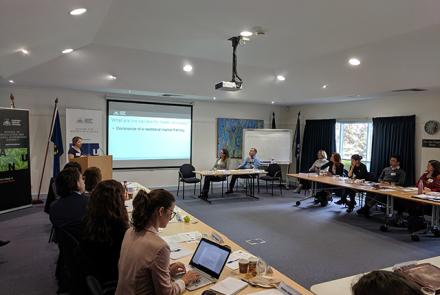Noncommunicable diseases (NCDs) such as coronary heart disease and lung cancer are the cause of nine out of ten deaths in Australia and have been labelled by the World Health Organisation as one of the major challenges for development in the 21st century. Governments and intergovernmental organisations have highlighted the urgent need for action to reduce NCD risk factors, however, policymakers face significant challenges to promoting greater policy coherence between health and other sectors, including trade and investment.

During the global week of action on NCDs, on 6 September 2019, RegNet scholars Dr Belinda Townsend and Dr Ashley Schram hosted the first national capacity-building roundtable on trade and NCDs, in collaboration with the NHMRC Centre for Research Excellence in the Social Determinants of Heath Equity and the Menzies Centre for Health Governance.
The national roundtable, held at the ANU, comprised a mix of academics from diverse disciplines and leading public health, medical, nutrition, alcohol and NCD-focused health associations and organisations, as well as advocates with a strong professional interest in NCD policy.
The roundtable focused on four key issues for NCDs – access to medicines, tobacco, alcohol, and nutrition. “Trade and investment agreements are a triple edged-sword for NCDs – they increase the supply of unhealthy goods, stifle regulation and keep the costs of treatment high” said Dr Ashley Schram.
Dr Schram’s research has shown how trade and investment agreements can increase consumption of unhealthy commodities through goods and services liberalisation, provisions that reduce tariffs (i.e. border taxes) on goods or eliminate restrictions on foreign direct investment. This has generally increased both the volume of health harmful commodity imports, as well as the local production, manufacturing and distribution of these products, alongside intensive marketing and advertising campaigns.
In contrast, increased pharmaceutical monopolies in trade agreements can create barriers for access to generic medicines to treat NCDs. Current proposals in the EU-Australia trade agreement include pressures on Australia to extend pharmaceutical monopolies, which could lead to paying higher prices for medicines for longer.
The roundtable also discussed the political and policy processes that can enable or constrain attention to health in trade policymaking. “Public health experts and advocates face ideological, structural and institutional barriers to promoting attention to the health consequences of trade provisions,” says Dr Belinda Townsend. Dr Townsend’s research has shown the factors that can shape attention or neglect of health in the trade domain in Australia, including the role of ideas, actors and political processes.
Participants discussed the barriers to facilitating greater attention to health in trade and investment agreements, such as minimal opportunities for meaningful engagement in the negotiation process, including lack of access to treaty text until after the agreement has been signed and no obligation on the part of Australia to conduct independent health impact assessments.
Dr Patricia Ranald from AFTINET identified the emerging landscape of trade and investment and the priorities for public health and civil society engagement. Participants also discussed examples from successful advocacy and principles that have shaped attention to social and health interests in other sectors.
The roundtable discussed emerging themes for greater trade literacy in the health sector, including next steps to demystify trade for the wider public health community, support governments to prioritise public health regulation, and explore further networking and collaboration.
Presenters at the event included Dr Belinda Townsend and Dr Ashley Schram, NHMRC Centre for Research Excellence in the Social Determinants of Health Equity, School of Regulation and Global Governance, ANU; Dr Paula O’Brien, University of Melbourne; Dr Deborah Gleeson, La Trobe University; Dr Anne Marie Thow, University of Sydney; Dr Pat Ranald, AFTINET; Ms Jane Martin; Obesity Policy Coalition; Mr Terry Slevin, Public Health Association of Australia; Dr Ingrid Johnston Public Health Association of Australia.
The event was supported by The Australian National University’s College of Asia and Pacific Asia-Pacific Innovation Program (APIP); the NHMRC Centre for Research Excellence in the Social Determinants of Health Equity; and hosted by the ANU Centre for European Studies.
The roundtable report is available here:
Original post “RegNet scholars host first national capacity-building roundtable on trade and health” By Belinda Townsend and Ashley Schram found here: RegNet News and Events

